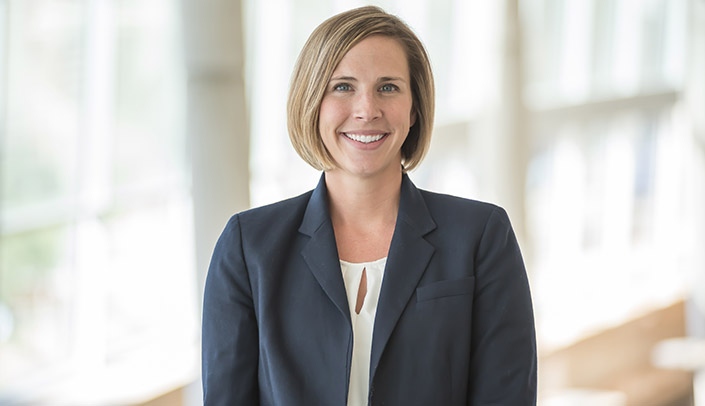This profile is part of a series to highlight the researchers who will be honored at a ceremony on Feb. 24 for UNMC's 2021 Scientist Laureate, Distinguished Scientist, New Investigator and Community Service to Research Award recipients.
The New Investigator Award
The New Investigator Award is given to outstanding UNMC scientists who, in the past two years, have secured their first funding from the National Institutes of Health, the Department of Defense or other national sources. New Investigator Award recipients also need to demonstrate scholarly activity, such as publishing their research and/or presenting their findings at national conventions.
- Name: Diane Ehlers, PhD
- Title: Assistant professor, UNMC Department of Neurological Sciences
- Joined UNMC: 2018
- Hometown: Elkhorn, Nebraska
Research focus: Exercise and cancer
Why is research important in the world today?
The current climate illustrates that science may be more important than ever to ensure evidence-based health information conquers the dangerous misinformation driving many people’s health choices. Related to my research, scientists know the importance of exercise as part of the standard of cancer care. But in order to achieve this, we are likely required to provide stronger scientific evidence of exercise’s role in slowing tumor progression, improving treatment efficacy and reducing mortality and recurrence. We need more research to warrant exercise as a component of cancer rehabilitation within clinical care.
My research will make a difference because: Quite a bit is known about exercise benefits in cancer prevention and control. However, one area recognized in the most recent exercise guidelines for cancer survivors as promising, but requiring more evidence, is exercise’s neurocognitive benefits. Our research aims to fill this knowledge gap by testing the effects of exercise training on neurocognitive function in women with breast cancer. The exercise program uses a community-based model, which we hope will accelerate the translation of our primary findings into community practice. My favorite thing about this research is that exercise isn’t a hard sell — patients want resources to support their adoption of physical activity, oncologists want their patients to move more. We get to answer important scientific questions while improving patients’ quality of life. It’s a win-win.
The best advice I’ve ever received is: Oh boy. This is tough to choose. One that resonates is my postdoctoral mentor always saying: “There are no good writers; only improving writers.”
Three things you may not know about me are:
- I have lived in seven states.
- I am a proud southpaw.
- I majored in English literary theory and criticism in college.

Congratulations Diane.